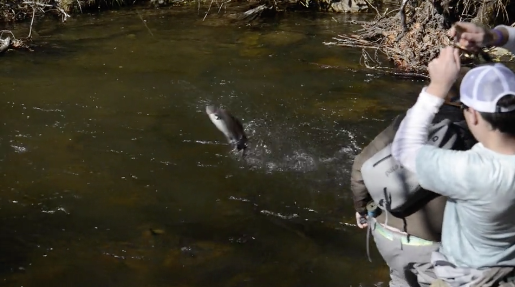Justin Pickett at Gink and Gasoline tackles an interesting phenomenon in the fly fishing world: anglers who abhore the idea of fishing private water for massive trout and aren’t shy about trashing those who do. I’ve seen it here, too. I post a lot of content for TU, both here on the blog and across social media platforms. Almost any post that deals with anglers fishing stretches of private water and catching fat, (probably) pellet-fed trout attracts folks who passionately argue against the practice. And, frankly, I’m being kind when I use the adverb “passionately.”
Often, they’re just downright mean.
I get it. Most of these fisheries are, at their core, artificial. There’s nothing—nothing—natural about a 10-pound brown trout being pulled from a mountain stream in northern Georgia. As Pickett notes in his post, there are plenty of private, pay-to-play fisheries all across America, and anglers looking for trophy trout gravitate to them. But he also notes that there are plenty of public waters to choose from—and thank God and Theodore Roosevelt for that—where anglers can tangle with wily wild and native trout.
Simply put, it’s a preference thing. I prefer the latter, but I learned a long time ago not to judge too harshly those who don’t. At least they’re fishing. And once someone starts fishing, they’ll start to care about the resources that make fishing happen.
Today, the American Fly Fishing Trade Association announced that it’s selling recycled paper fly boxes in an effort to reduce the amount of plastic the fly fishing industry contributes to the environment. According to AFFTA, the industry is responsible for 3.5 million plastic containers every year, and that using paper boxes will help eat into that number and reduce waste.
Now, I’ll admit, my first reaction when I saw the boxes was from the perspective of the consumer—they’re not cheap. But I thought about it for a bit, and did a mental inventory of my fly boxes in the basement and realized that I might be responsible for a good third of the industry’s plastic consumption. Here’s to AFFTA for tackling a big challenge and working to reduce the industry’s footprint on the waters we love to fish. One trip to the beaches of the Mayan Riviera will prove to you that there’s just too much plastic floating around out there, so, as the industry’s trade association, I find it refreshing to see AFFTA also adopting the conscience of fly fishing. Nicely done.
Finally, here’s to Gov. Jay Inslee of Washington, whose administration is pushing the notion that the amount of public lands in his state should continue to grow with Washington’s population. It’s a refreshing perspective, particularly in the West, where many state legislatures are pushing for the exact opposite outcome. In places like Utah, Idaho, Montana and Wyoming, lawmakers are floating bill-mill legislation that seeks to transfer federal lands to states for management and eventual sale. Inslee sees the value in public lands for outdoor recreation, a $640 billion industry in the United States and one that is starting to flex its muscles.
The Outdoor Industry of America is relocating its twice-yearly trade shows from Salt Lake City to a yet-to-be-determined location in response to Utah’s political leadership that is continuing to push for public lands transfers and national monument alteration. Inslee’s Washington might make an appealing destination for the winter and summer Outdoor Retailer trade shows, and other states’ leaders are chiming in, too, seeking to attract the shows that bring in about $45 million annual to the Salt Lake economy.
More public lands as the population grows. What a great idea.
— Chris Hunt



